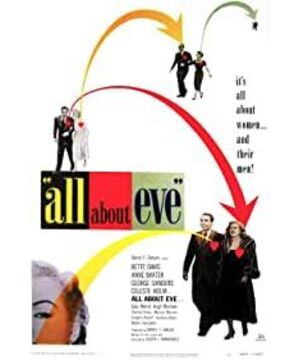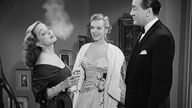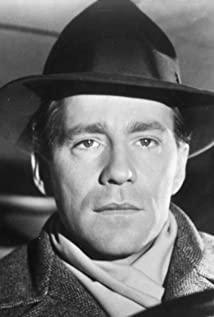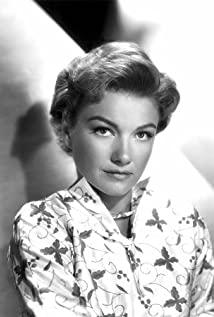Not all Hollywood narratives only promote its somewhat naive universal value to the general public. The same is a Hollywood movie, with the same classic narrative mode, and there will be stories of bold avant-garde criticism, such as this "Comet Beauty". The movie portrays the frightening history of a careerist.
The film uses a flashback technique to tell the story through Karen's narration. The beginning of the film is not the beginning of the story, but the end of the story. The first scene was set in the venue of the award ceremony for the Outstanding Achievement Award in Sarasiton Drama. The first shot begins with a close-up of the trophy. From this, all the characters in the scene show one by one. The theme of the story is also cleverly implied in the first shot. The presenter of the awards for Eva on the stage spared no effort to praise the outstanding young actor Eva, but the various characters in the audience had different reactions. The line of the award-presenter also has a special design, and the audience who watched the film once again formed a huge irony when they recollected it. In the words of Edson Duvitt, the characters in the story are introduced one by one. The genius actor Margot, who has been on the stage at the age of four, and Karen, who only entered the theater circle because of her husband. Why did Edson Duvitt come to introduce the characters? Only after seeing the movie did I know the ingenious design of the screenwriter. The character Edson Duvitt plays the role of "exporter" in this film, and what he outputs is the film's values. It is up to him to tell the audience the story behind the glamorous celebrity circle in the theater industry. Unknown deeds and conspiracies hidden in trophies and flowers with fascinating aura. The director wants to tell us the story behind fame and fortune, and the title cleverly hints at the theme of "Comet Beauty".
In the seventh minute, Karen sitting in the venue fell into the memory of the past, and the story really began, entering the first paragraph of the story, which is the construction link that Cidfield said. Karen sees Eva at the door of Margot's dressing room. Eva first appeared as a crazy admirer of Margot. Eva tells Karen Margot that she will go to every scene, Karen asks her if the tickets are too expensive, and Eva says she can still pay for the standing tickets. Eva is answering Karen's questions and making Karen agree with him, and these words are also spoken to the audience. The audience also identified with Eva, a poor but sincere theater lover who is also an absolute admirer of Margot. This became reasonable for the plot of Margot taking Eva by his side. After all, how cute and sympathetic Eva is at this time.
Karen took Eva to meet Margot and led Eva through the stage to the backstage. At this time, the screenwriter began to plant the "seeds" for the film. As soon as Eva entered the theater, she immediately walked to the stage and watched in a trance. Looking at the empty auditorium. And said to Karen, "You can smell the pungent smell, like a magical perfume." This small plot is a foreshadowing, very cleverly reveals Eva's inner true thoughts: she is not longing for Margot, and It's the smell of this magical perfume-like stage.
Karen didn’t take Eva to see Margot immediately, but showed Margot before Eva went in. Before she could hear her, we heard Margot’s hearty spirit when we were outside the door. Laugh, from Margot's words we see a straightforward, proud, domineering star. As soon as Karen saw Margot, he had a small friction with Margot for an inconsistent view. All this is to pave the way for the later story.
At first Margot didn't want to see Eva, but under Karen's efforts, Margot finally made a change, and Eva entered Margot's dressing room. If Eva is just as an ordinary audience meeting the big star in her heart, then the story will stop here. It was Eva's sympathetic love story that touched everyone, including the audience, and stayed with Margot to keep the story going. The screenwriter here omitted the truth and created a false plot. The audience and the people in the play were deceived by Eva, thinking that she was a poor woman who had lost her husband and was loyal to love. At this time, empathy finally formed, and everyone agreed with Eva.
The foreshadowing part explains the background of the story, the main scenes, and the various characteristics and situations of the main characters. Margot is a proud star but is not young. Eva is young and pitiful and sincerely worships Margot. At the same time, it also planted the seeds for the development of the story. Karen had a lot of opinions on Margot's indomitability and had deep sympathy for Eva. The truth of Eva was buried at this time, and it was slowly revealed as the story progressed.
In the 27th minute, Margot sent away Simpson, Eva officially entered Margot's life, the plot point occurred. At this time, the foreshadowing is over, and the development stage of the plot is entered.
The main plot of the second stage is Eva's gradual action in order to realize her ambition, and the secondary plot is Margot's transformation.
At this stage, the viewpoint quietly changed, from an objective viewpoint to Margot's viewpoint gradually. Together with Margot, we subconsciously began to discover something wrong with Eva, but the other characters in the play did not know it.
After a curtain call, Margot discovered that Eva was holding the costume she had just taken off and making gestures on her body, and imagined that she was standing on the stage and giving a curtain call to countless audiences. This plot is a typical sign. We faintly smelled a certain smell, yes, it was the smell of ambition. This premonitory atmosphere slowly spread, preparing for the outbreak of subsequent conflicts.
If there is a certain kind of "unity" in creating an omen atmosphere, there will be "diversity" in the various events that show it. Margot's subsequent dialogue with the servant in the bedroom is also one of this variety. Servant seemingly rough but a way to explain the true meaning:. "She is like you study, as you play in research, take notes, read your book, how you walk, talk, eat, think"
when Iraq Baby put on Margot's clothes, called Simpson, and after all Margot felt the threat from Eva. The irresistible contradiction finally began to arise between Margot and Eva. Eva played a scene in place of Margot. Margot’s emotions began to be out of control. One person makes a contradiction.
The main line and the secondary line are mutually influencing and entangled. Eva’s step-by-step action made Margot more and more emotionally out of control, which made everyone disgusted. Margot’s emotional out-of-control gave Eva a chance to achieve her set steps. go.
It can be said that Margot's emotional out of control can also be said that Eva's strategy made Karen decide to punish Margot for helping Eva and set up a car breakdown. This is the second plot point of the story.
This plot point two gave a new direction to the two plot lines of the main line and the secondary line. Margot realized that she was old and should find a new life. She said in the car: "You abandon the stairs in order to climb faster. Forget that you will need them again when you become a woman again. Whether you like it or not, every woman’s career will end. Become a woman.” The things on the stairs mentioned by Margot should refer to Simpson’s treatment of her. The love belongs to herself rather than the real life of a female star. A star is not immortal, she can't live in the illusion forever, one day she has to accept the real life. This prompted Margot to agree to Simpson's marriage proposal and decided to live a different life. She put aside the fight with Eva. In fact, from this moment on, the contradiction has begun to disappear. To be precise, the contradiction between Margot and Eva has disappeared. Because Margot has seen all this. The character of Margot has undergone a character transformation from the beginning to the present, which has become a character arc. The truth about Margot's character is revealed at this moment. And Margot's transformation is undoubtedly closely related to the action of the main line Eva. Plot 2 completes the transformation of Margot and also makes Eva's actions stronger and stronger. The end of the secondary line does not mean the end of the main line. Eva has higher goals waiting for her to achieve.
The reason why love point two also promoted the development of the main line. Eva performed smoothly because of the car, and colluded with film critic Edson. And Eva used the car incident to threaten Karen so as to get a new role and finally got the Salahidon Outstanding Achievement Award.
Edson appeared in this passage and became a very important character, he was here to reveal the truth about Eva. Edson had a brief conversation with Eva when she finished removing her makeup. Edson asked if Eva had seen Margot's play in the Schubert Theater, and Eva answered yes without even thinking about it. This is an important plot, which paved the way for Edson to uncover Eva's secret later and also provided convincing evidence for the audience.
Eva threatened Karen's plot to become the climax of the story, and in the end Eva succeeded and got everything she had hoped for in the first place. But in addition to these, her ambitions intensified, even trying to get Karen's husband. She really became an omnipotent demon. But Edson's appearance made it impossible for her to do whatever she wanted, because he was the only one who knew her past and her secrets. Edson's explanation of Eva At the end of the story, we finally see the truth about Eva.
The story could have ended here, but the brilliant screenwriter arranged a meaningful character at the end of the film, that is, the young girl waiting in Eva's room. This end is neither a closed end nor an open end, but the end of an endless loop. Eva returned to the room. She was no longer the original Eva, but the girl in the mirror was clearly another Eva. This young girl formed a correspondence with Eva. It implies that the fight for fame and fortune will circulate. In the end, the young girl wore Eva’s clothes and held Eva’s trophy in front of many mirrors. Multi-faceted mirrors reflect the faces of countless young girls, suggesting the desires of countless careerists. Also sneered at such a world of Vanity Fair.
View more about All About Eve reviews











